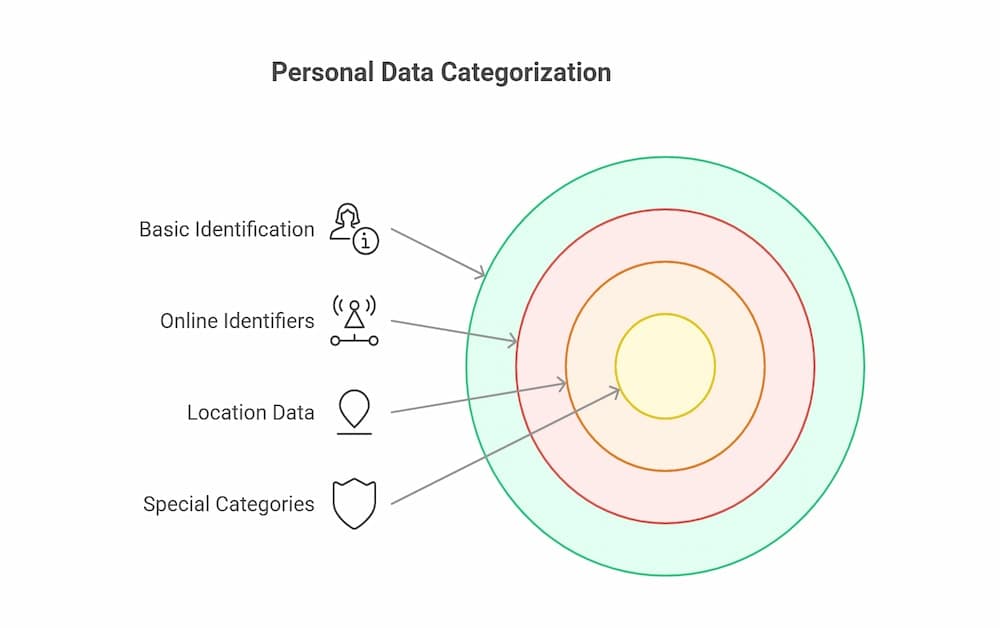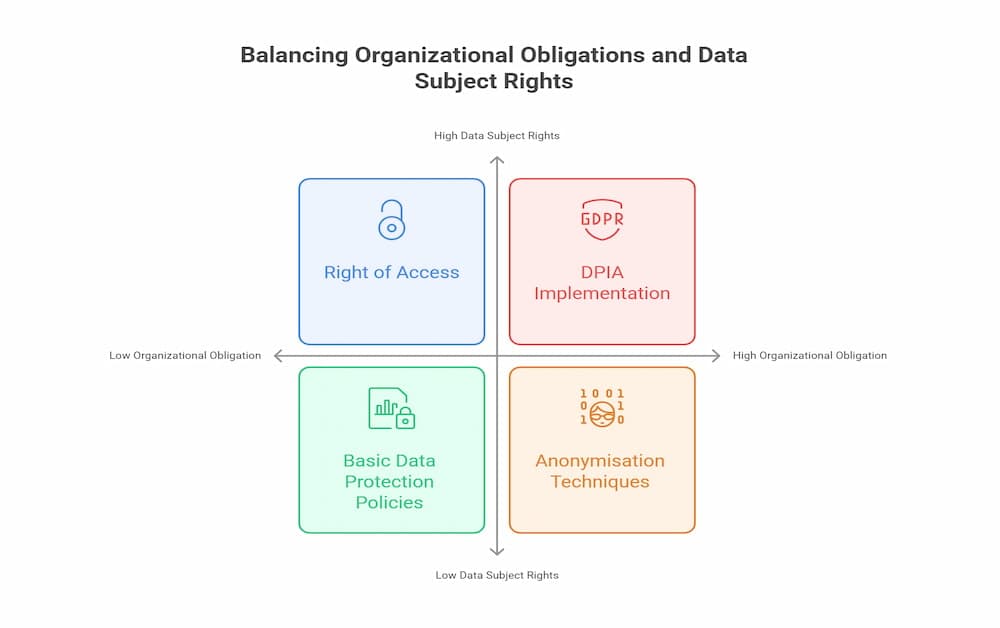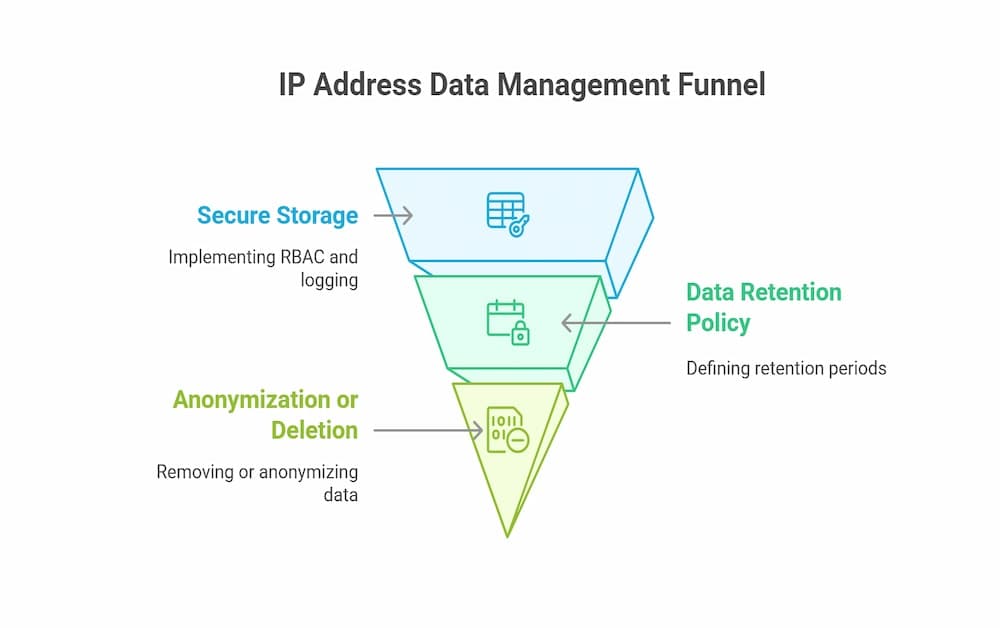Introduction
The General Data Protection Regulation (GDPR) is the cornerstone of data protection across the European Union (EU), designed to safeguard the personal data of individuals and harmonize data protection laws among member states. At its heart, the GDPR regulates the processing of personal data of data subjects, defined as identified or identifiable natural persons. Under the GDPR framework, personal data includes “any information relating to an identified or identifiable natural person,” explicitly naming online identifiers such as IP addresses and location data.
By classifying IP addresses as personal data, the GDPR seeks to empower data subjects with rights, such as access, rectification, and erasure, and impose obligations on data controllers and data processors to implement data protection measures, obtain explicit consent, or otherwise identify a lawful basis for processing.
- Free 7-day trial
- No setup fees
- Cancel anytime
Understanding the GDPR’s scope and definitions is critical for businesses and online services—including websites, mobile apps, and Internet service providers (ISPs)—to ensure compliance and avoid regulatory penalties. With the rise of technological developments—from MAC addresses to biometric data—Organizations must navigate a complex landscape to process personal data lawfully and protect sensitive personal data such as health data or political opinions.
GDPR’s Broad Definition
Under Article 4(1) of the GDPR, personal data is defined as “any information relating to an identified or identifiable natural person”, where an identifiable natural person can be identified, directly or indirectly, by reference to an identifier. These identifiers include names, identification numbers, location data, online identifiers, and any other identifiers that can single out a particular person. By interpreting “any information” broadly, the GDPR ensures that even seemingly innocuous data, such as digital addresses (IP addresses), traffic logs, or device-connected identifiers, are protected if they can be linked back to a person.
Special Categories and Sensitive Data
Beyond standard personal data, the GDPR designates “special categories” of personal data—often called sensitive data—which require even stronger protections (Article 9).
This encompasses data that discloses an individual’s racial or ethnic background, political beliefs, religious or philosophical views, union membership, genetic information, biometric data used for unique identification, health-related information, and details about a person’s sex life or sexual orientation. While IP addresses are not categorized as special categories, they remain personal data and must be handled with care, especially when combined with location data or health data, which could exacerbate privacy risks.
Why IP Addresses Qualify as Personal Data
IP addresses—whether public or private—are numerical labels assigned to devices for communication on the Internet Protocol.
Under the GDPR, they fall under online identifiers because they can reveal both a device’s geographical location and, when linked with ISP records, the identity of the data subject behind the connection. In Breyer (C-582/14), the CJEU explicitly affirmed that dynamic IP addresses can constitute personal data if a controller can practically and legally obtain additional information from the ISP to identify the individual.
Static vs. Dynamic IPs
- Static IP addresses remain constant over time and can be directly tied to a particular consumer or household, making them straightforward to identify and thus unequivocally personal data.
- Dynamic IP addresses, which change frequently, are still considered personal data if the data controller can combine them with other information (e.g., location data, session logs, or account credentials) to single out an identifiable individual.
Furthermore, an IP address held in conjunction with a timestamp or traffic data enables the reconstruction of an individual’s online activities, underscoring its status as personally identifiable information (PII) under both GDPR and other privacy laws, such as the California Consumer Privacy Act (CCPA).

Categorization of Personal Data
Personal data can be broadly classified into:
- Basic identification information: Names, home address, phone number, and identification numbers.
- Online identifiers: IP addresses, MAC addresses, cookies, device IDs.
- Location data: GPS, Wi-Fi data, cell tower triangulation.
- Special categories (sensitive data): Health and genetic data, biometric data, religious or political beliefs.
Location Data and Contextual Identifiers
Location data derived from IP addresses or GPS signals can pinpoint a user’s movements and constitute personal data if it traces back to an identifiable natural person. When linked with other identifiers, such as account credentials or account usage patterns, the result is a comprehensive profile that heightens privacy risks and necessitates strong safeguards.
Data Collection and IP Addresses Collected
Organizations frequently collect IP addresses for purposes such as:
- Security: Detecting anomalies and thwarting data breaches.
- Analytics: Tracking unique visitors, geolocation analytics, and usage patterns.
- Marketing: Geotargeting advertisements and personalizing content.
IP addresses may be harvested via website server logs, embedded tracking scripts, mobile apps, or cloud services. Each collection point must adhere to GDPR principles.
- Free 7-day trial
- No setup fees
- Cancel anytime
Consent and Lawful Basis
Under the GDPR, collecting IP addresses requires a lawful basis (Art. 6), which includes:
- Consent: Explicit, informed, and freely given.
- Legitimate interests: When necessary for the controller’s or a third party’s interests, balanced against the impact on the data subject.
- Legal obligations: For instance, retaining logs to comply with financial or cybersecurity regulations.
Data subjects must receive clear information about how their IP addresses will be processed, and they retain the right to access, rectify, or erase this data.
Considered Personal Data and Its Implications

Implications for Organizations
Treating IP addresses as personal data imposes critical obligations on organizations to:
- Maintain data protection policies and retention schedules that prevent excessive storage.
- Implement anonymisation or pseudonymisation to minimize identifiability.
- Conduct Data Protection Impact Assessments (DPIAs) for high-risk processing activities.
Failing to comply can lead to substantial regulatory penalties—up to 4% of global turnover or €20 million, whichever is higher.
Data Subject Rights
IP addresses being personal data grant data subjects specific rights:
- Right of access: Confirmation of whether their IP is being processed and for what purpose.
- Right to erasure (“right to be forgotten” ): Deletion when data are no longer necessary.
- Right to restriction: Limiting processing under certain conditions (e.g., pending dispute).
Organizations must respond to such requests within one month to remain compliant.
Fundamental GDPR Principles
Any processing of IP addresses must adhere to the GDPR’s core principles (Art. 5):
- Lawfulness, fairness, and transparency.
- Purpose limitation: Collected for specified, explicit, legitimate purposes.
- Data minimisation: Adequate, relevant, and limited to what is necessary.
- Accuracy: Kept up to date.
- Storage limitation: Retained no longer than necessary.
- Integrity and confidentiality: Processed securely.
Technical and Organizational Measures
To safeguard IP address data, organizations should adopt measures such as:
- Encryption in transit and at rest.
- Access controls and logging of data access.
- Regular audits and employee training on data protection.
- Anonymisation protocols to strip identifying elements when possible.
IP Address and Data Collection Practices
Clear, concise privacy notices must explain:
- What IP address data is collected.
- The legal basis for collection (consent, legitimate interests).
- Data transfer arrangements (e.g., to third-party analytics or cloud providers).
- Retention policies and rights available to data subjects.
Third-Party Processors
Engaging third-party processors (e.g., CDN providers, analytics tools) demands:
- Data Processing Agreements (DPAs).
- Ensuring processors uphold GDPR standards and use adequate security measures.
GDPR vs. CCPA
While the GDPR automatically treats IP addresses as personal data, the California Consumer Privacy Act (CCPA) classifies IP addresses as personal information if they can be “reasonably linked, directly or indirectly, with a particular consumer or household.” The California Attorney General enforces CCPA, imposing fines for non-compliance and granting consumers rights similar to those under GDPR.
Global Landscape
In addition to the ongoing developments within the European Union and the state of California regarding privacy laws, there is a notable expansion of similar legislation in various countries around the world. Privacy laws in Canada, for example, are increasingly aligning with global standards, as are those in Brazil with its General Data Protection Law (LGPD). Collectively, these regulations are beginning to explicitly recognize not only personal identification information but also Internet Protocol (IP) addresses as personal data. This shift highlights an important global trend that is emerging in response to growing concerns about data privacy and online security. As jurisdictions around the world enact stricter privacy laws, there is a clear movement toward bolstering protections for individuals’ online activities and ensuring that their personal information is safeguarded against misuse.

Handling IP Addresses and Data
Organizations must store IP addresses under strict security protocols, including:
- Role-based access controls (RBAC) restrict access to raw IP data.
- Logging of data access and modifications.
- Regular vulnerability assessments to detect potential breaches.
Data Retention and Deletion
Adopt a data retention policy that:
- Specifies retention periods tailored to the processing purpose (e.g., 30 days for security logs).
- Mandates anonymisation or deletion of IP data once the purpose is fulfilled.
Best Practices for Data Processing
Organizations must implement best practices for data processing to ensure compliance with the GDPR. This includes implementing data protection policies and procedures, providing training to employees, and conducting regular audits. Organizations must also implement technical and organizational measures to protect personal data, including IP addresses.
Data protection is an ongoing process that requires continuous monitoring and improvement. Best practices for data processing can help organizations protect personal data and avoid regulatory penalties. Engaging with data protection officers and legal experts can provide valuable guidance in maintaining compliance and addressing emerging privacy risks.
Conclusion
In summary, the General Data Protection Regulation (GDPR) unequivocally classifies IP addresses as personal data, which fundamentally alters the way organizations must handle such information. Therefore, it is imperative that organizations treat IP addresses with the same level of diligence and care as they would with any other personal or sensitive data. The compliance with the GDPR’s stringent requirements is not merely a best practice, but rather a non-negotiable obligation for organizations operating in or interacting with the European Union. This compliance encompasses a variety of essential actions, starting with the necessity of obtaining a lawful basis for processing IP addresses, which can include user consent or legitimate interests, as outlined by the regulation.
Moreover, organizations are required to implement robust technical safeguards aimed at protecting this data, which could involve encryption, access controls, and regular audits of data handling practices. Adhering to the principle of data minimization ensures that only the necessary amount of personal data is collected and processed, thereby reducing potential liabilities and enhancing user trust. Additionally, it is crucial for organizations to respect and uphold the rights of data subjects, which are integral to the GDPR framework. This includes the rights to access, rectification, erasure, and objection to the processing of their personal data.
As global privacy laws increasingly converge on the recognition of online identifiers, such as IP addresses, as personal data, organizations must remain vigilant and proactive in updating their data protection practices. Continuous education and training of staff regarding privacy regulations, as well as regular reviews of data management strategies, are essential to navigate this complex landscape. Such diligence not only helps to mitigate privacy risks but also plays a substantial role in avoiding significant regulatory penalties and fostering a culture of compliance within the organization. Ultimately, as the landscape of digital privacy evolves, an unwavering commitment to protecting personal data will be vital for any organization hoping to maintain both legal compliance and customer trust.



